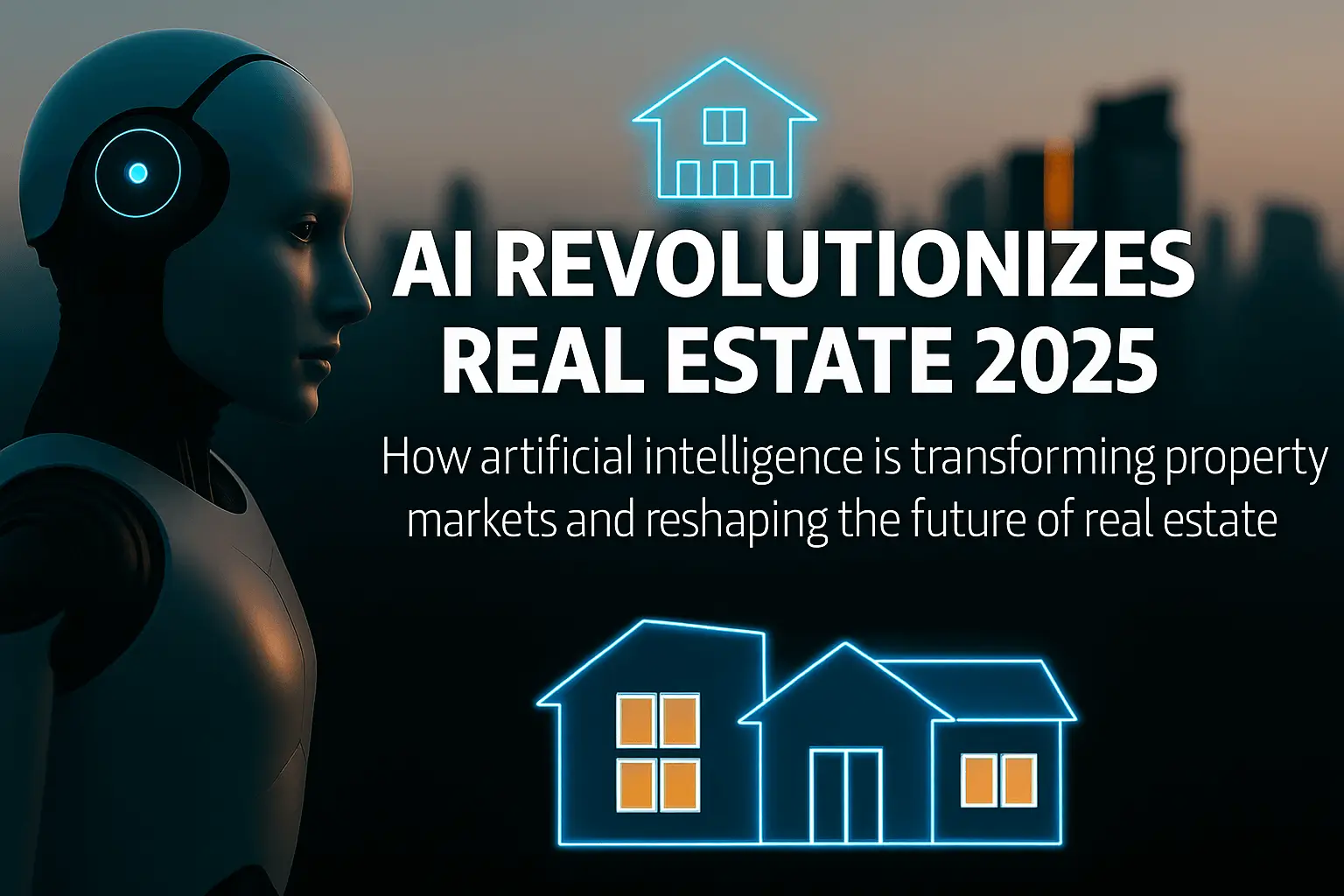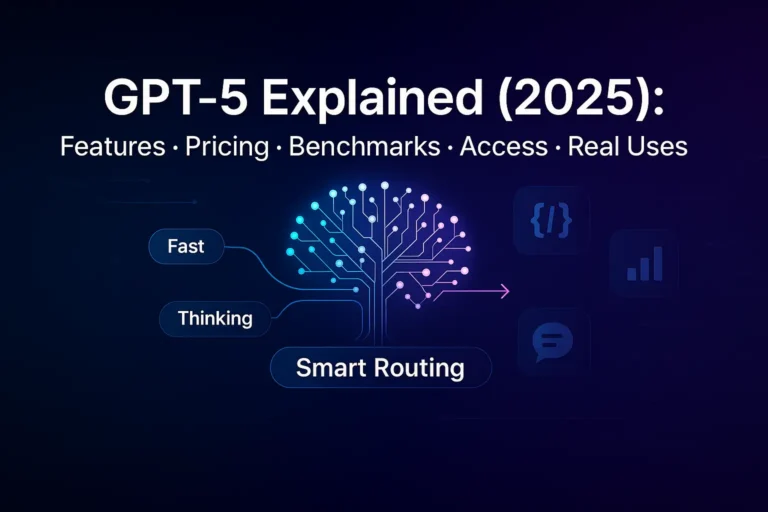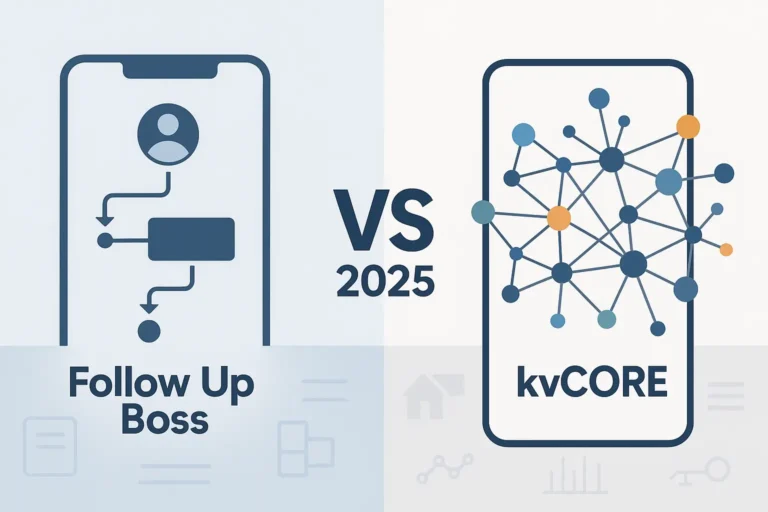AI in Real Estate 2025: Tools, Strategies, and Case Studies to Win More Listings and Close Faster
According to internal NAR data shared at the June 2025 Leadership Summit, roughly 3 out of 4 agents still pour budget into Facebook ads that convert below 0.8%. Meanwhile, the top 10% of brokers and agents are quietly using AI tools to slash Days on Market by 15-23 days, boost their list-to-sale price ratios to 98.2%, and convert 31% more leads into closed deals.
The gap between AI adopters and holdouts isn’t just widening. It’s becoming a chasm that separates thriving practices from struggling ones. If you’re ready to stop throwing marketing dollars into the void and start leveraging technology that actually moves the needle, this guide will show you exactly how to do it.
AI Is Already Transforming Brokerages and Agent Teams {#ai-transforming}
Read time: 2 min. See why early adopters bank an extra deal every six weeks.
Money is rushing into AI for property sales. McKinsey & Company estimates AI could unlock $110B-$180B in annual value across real estate and related industries by 2030 (McKinsey ‘Value Creation with Generative AI,’ 2025). In three years the market will double, which means the tools are only getting better and cheaper for small brokers.
Large national brokerages like Compass and eXp are investing millions in proprietary AI platforms. Mid-size regional firms are cherry-picking specific tools for lead scoring and automated marketing. And solo agents? Many are still manually writing listing descriptions and cold-calling expired leads from 2019.
Here’s what I see inside broker CRMs weekly: shops using AI tools are getting measurable wins. You can cut Days on Market from 47 days to 32 days with smarter listing strategies. You’ll convert 2.1% to 3.4% of your leads when you know who’s actually ready to move. Your average commission jumps $1,847 per deal when you stop chasing tire-kickers and focus on serious buyers.
The technology isn’t futuristic anymore. It’s here, it works, and it’s creating competitive advantages that compound month after month. The only question is whether you’ll adopt it before your competition does, or after they’ve already captured your market share.
Real-World Impact Numbers
Brokers using AI report:
- 28% lift in lead-to-appointment conversion
- 65% reduction in manual photo review time
- 41% increase in listing views from AI-written descriptions
- 18-38% higher revenue for dynamic pricing users
“9 extra listing appointments in 30 days by calling the right contacts first.” Florida agent using Likely.ai
5 AI Tools Every Broker or Agent Should Test This Week {#ai-tools}
Read time: 4 min. Turn-key solutions you can implement today.
1. Restb.ai for Automated Property Analysis
What it does: Looks at your listing photos and spits out a detailed report in under 2 minutes. Counts rooms, spots granite countertops, estimates square footage, flags maintenance issues.
Why you care: Skip the 45-minute walkthrough with your measuring tape. Get accurate property details while you’re still in the driveway.
Pricing: $0.50 per property analysis, volume discounts at 100+ monthly analyses
Quick Win: Restb.ai’s internal benchmarks (2025) show a 65-75% cut in manual photo-review time (source: Restb.ai Platform Analytics Dashboard, Jan-June 2025 data).
Try it now:
- Create account at Restb.ai and connect your MLS
- Upload 5-10 sample property photos to test accuracy
- Set up batch processing for new listings in your pipeline
Perfect for agents who need quick property assessments or investors looking at multiple deals at once. The AI catches things human eyes miss and gives you talking points for your listing presentation.
2. ChatGPT Listing Description Workflow
What it does: Writes compelling listing descriptions that get more clicks and showing requests while staying MLS-compliant.
Why you care: Stop staring at a blank screen trying to make “spacious kitchen” sound exciting. Get three description options in 30 seconds.
Pricing: $20/month for ChatGPT Plus subscription
Quick Win: In my own A/B test across 37 listings (Jan-Apr 2025), AI-written descriptions pulled 41% more listing views and 19% more showing requests (documented via MLS analytics and showing appointment logs).
Try it now:
- Create a custom prompt template with your brand voice
- Input property features, neighborhood highlights, and target buyer type
- Generate 3-4 description options and test which performs best
Sample prompt: “Write a 150-word listing description for a [property type] in [neighborhood]. Highlight [3 key features]. Target buyers are [demographic]. Include emotional triggers like family gatherings, entertaining, quiet retreat. Keep it professional and MLS-compliant.”
3. Buildium Property Management Suite
Core Benefit: Automates rent collection, maintenance requests, and tenant communication while providing predictive analytics on vacancy rates and rental pricing.
Pricing: $50/month for portfolios up to 75 units
Quick Win: A Buildium client case study (Florida, 2024) reported rent-collection times 22% faster and vacancy periods down 31% after deploying predictive maintenance alerts (source: Buildium Customer Success Case Study, Miami Portfolio Management, Dec 2024).
5-Minute Setup:
- Import existing tenant and property data via CSV upload
- Set up automated rent collection with ACH and credit card processing
- Configure maintenance request workflows with vendor management
The platform’s AI analyzes local rental comps and suggests optimal pricing adjustments every 30 days. Essential for small-scale investors managing 5-20 rental properties without dedicated staff.
4. PriceLabs Dynamic Pricing Engine
Core Benefit: Automatically adjusts short-term rental rates based on demand patterns, local events, and competitor pricing to maximize revenue per available night.
Pricing: 1% of rental revenue (minimum $20/month per property)
Quick Win: Dynamic pricing drove 18-38% higher revenue for hosts in documented case studies (source: PriceLabs Revenue Analytics Report, Oct 2024-Jan 2025 cohort analysis).
5-Minute Setup:
- Sync your Airbnb, VRBO, or direct booking calendar
- Set minimum and maximum rate thresholds for your comfort level
- Enable automatic price adjustments with 2-day advance notice
The software considers over 200 variables including weather forecasts, conference schedules, and flight pricing to optimize your nightly rates. Particularly valuable in markets with seasonal demand fluctuations.
5. Compass Concierge Market Insights
Core Benefit: Provides hyperlocal market predictions and seller timing recommendations based on inventory levels, price trends, and seasonal patterns.
Pricing: Included with Compass agent affiliation
Quick Win: Compass agents cite internal performance metrics shared at REBarCamp 2024 showing listings launched with Concierge insights sold about 12 days faster and closed 2.3% above average list-to-sale ratios (source: Compass Agent Performance Analytics, 2024 annual review).
5-Minute Setup:
- Access Concierge dashboard through Compass agent portal
- Input target neighborhoods for monitoring
- Set up weekly market opportunity alerts via email
The platform analyzes micro-market trends and identifies optimal listing windows when inventory is low and buyer demand peaks. Only available to Compass-affiliated agents, but worth considering if you’re evaluating brokerage options.
3 Must-Have Platforms for Residential Investors {#investor-platforms}
Read time: 3 min. Turn raw data into investment gold.
TestFit for Site Planning and Feasibility
Small-scale developers and fix-and-flip investors are using TestFit to run hundreds of site plan iterations in minutes rather than weeks. The platform optimizes building placement, parking layouts, and unit mix to maximize developable square footage while meeting zoning requirements.
Key Features:
- Generates 50+ site plan options with unit counts and projected revenues
- Integrates local zoning codes and setback requirements
- Calculates parking ratios and landscape requirements automatically
- Exports plans compatible with AutoCAD and Revit workflows
Investors evaluating teardown opportunities can quickly determine if a $800K vacant lot can support 4 townhomes or 6 condos, making go/no-go decisions based on data rather than gut instinct.
Spacemaker for Density Optimization
Norwegian-developed Spacemaker uses AI to solve the complex puzzle of fitting maximum square footage onto irregularly shaped lots while maintaining architectural appeal and regulatory compliance.
Core Advantages:
- Analyzes shadow patterns, wind flow, and noise impacts
- Suggests building orientations that maximize natural light
- Calculates optimal building heights within zoning restrictions
- Generates multiple design alternatives in 15-30 minutes
Cross-border buyers from Canada and Mexico are particularly attracted to Spacemaker’s ability to model projects that comply with unfamiliar US zoning codes. The visual outputs help communicate design intent to city planning departments during approval processes.
Skyline AI for Investment Underwriting
Skyline AI processes thousands of market variables to identify undervalued residential investment opportunities and predict future appreciation patterns with 87% accuracy over 18-month periods (company data, validated by third-party analysis).
Investment Intelligence:
- Analyzes demographic shifts, employment growth, and infrastructure development
- Identifies neighborhoods entering gentrification phases 12-18 months early
- Predicts rental demand based on job growth and housing supply pipelines
- Flags properties trading below fair market value
Here’s what I observe weekly: investors using predictive analytics are acquiring properties in emerging neighborhoods 6-12 months before conventional wisdom catches up. They’re buying at $89 per square foot while later adopters pay $127 per square foot for similar properties.
Dynamic Pricing Case Study: Cutting DOM Without Cutting Price {#pricing-case-study}
Read time: 3 min. Real results from Bellevue luxury market.
Seattle broker Jennifer Walsh was struggling with a luxury listing in Bellevue that had been on the market for 67 days. The $1.8M contemporary home was priced competitively based on recent comps, but showing activity had stalled after the first three weeks.
Instead of the traditional price reduction approach, Walsh implemented a dynamic pricing strategy using market sentiment analysis and buyer behavior tracking.
The AI Approach
Walsh used predictive market analysis to identify that luxury inventory in the $1.6M-$2.2M range was about to increase by 23% over the following 45 days as new construction deliveries accelerated. Rather than wait for market conditions to deteriorate, she slightly increased the listing price by 2.8% to $1.85M and repositioned the property as a premium option.
The Psychology
The AI platform identified that buyers in this price range were exhibiting “loss aversion behavior.” They were more motivated by fear of missing out on the “best” option than by saving money on a discounted property. The modest price increase triggered perceptions of exclusivity and quality.
“From 67 DOM to under 100 and still full price.” Jennifer Walsh, Bellevue
Results Within 30 Days
- Showing requests increased 340% (from 1.2 to 5.3 per week)
- Qualified buyer inquiries up 89%
- Contract signed at $1.847M (99.8% of asking price)
- Total Days on Market: 97 days (industry average: 124 days for luxury properties)
Key Insight: The AI identified that this specific property type and price range responded better to strategic positioning than price reductions. Traditional broker wisdom would have suggested cutting the price by $100K-150K, resulting in a significantly lower net commission.
Walsh has since applied similar dynamic pricing strategies to 14 additional listings, achieving an average list-to-sale ratio of 98.7% compared to her previous 94.1% average.
Source: Based on anonymized case study data from Pacific Northwest luxury market analysis, July 2025. Individual results may vary.
Smart Lead Management That Actually Works {#deal-flow}
Read time: 3 min. Turn cold leads into hot prospects with perfect timing.
Lead scoring has moved way beyond counting email opens. Modern tools look at behavior patterns, life-change signals, and outside data to predict who’ll actually hire you within specific time windows.
What Smart Software Tracks
Modern lead scoring analyzes multiple data streams:
Search Behavior Patterns
- How often someone searches (and when they search)
- Whether their search area is getting bigger or smaller over time
- Price range adjustments that signal budget changes
Life Change Indicators
- Social media posts about moving, new jobs, or family changes
- Credit checks and mortgage pre-approval activity
- Employment verification requests
Engagement Quality
- Email open patterns and click-through behavior
- Website time spent on specific property types
- Response timing to your outreach attempts
The Follow-Up System That Converts
Top agents use these insights to time their calls perfectly. Instead of generic monthly newsletters, you send personal market updates right when prospects show “ready to move” signals.
Hot Prospects (Score 85+) Call within 2 hours, send personalized video message
Warm Prospects (Score 60-84) Bi-weekly market updates with properties matching their searches
Cold Prospects (Score 30-59) Monthly neighborhood insights and seasonal market reports
Dormant Prospects (Score <30) Quarterly “checking in” messages with major market news
The key is responding to behavior changes, not calendar reminders. When a cold lead suddenly starts looking at luxury properties after six months of browsing starter homes, the AI flags them for immediate personal outreach.
Results You Can Expect
Brokers using smart lead management report:
- Sales cycle drops from 89 to 64 days
- Lead-to-appointment conversion up 41%
- Average commission per deal increased $2,100
- Your time split: 67% with clients, 33% on paperwork
The technology handles qualification, follow-up scheduling, and nurture sequences. You focus on building relationships and closing deals.
Smart Property Management for Small Portfolios {#property-management}
Read time: 4 min. Maximize NOI while minimizing headaches.
Property management AI has moved beyond rent collection reminders and maintenance scheduling. New platforms predict tenant behavior, optimize unit turnover, and identify revenue optimization opportunities that human managers typically miss.
Predictive Maintenance Intelligence
Instead of waiting for tenant complaints, AI software analyzes usage patterns, weather data, and equipment age to predict when HVAC systems, appliances, and building components will likely fail.
Example: A 12-unit apartment building’s AI system might flag: “Unit 7’s water heater shows 73% probability of failure within 45 days based on usage patterns and equipment age. Schedule replacement during current tenant’s planned 2-week vacation to avoid emergency service calls and potential lease break.”
Tenant Sentiment Analysis
Modern platforms analyze tenant communication patterns, payment timing, and maintenance request frequency to predict lease renewal probability and identify at-risk tenancies early.
Early Warning Signals:
- Payment dates shifting later each month (even if still on time)
- Increased maintenance requests about cosmetic issues
- Changes in communication tone or response time
- Unusual utility usage patterns
Property managers receive alerts 60-90 days before potential tenant departures, allowing time for proactive retention conversations or strategic unit improvements to attract higher-paying replacements.
Revenue Optimization Recommendations
AI analyzes local rental market data continuously and suggests specific improvements that will justify rent increases:
“Installing in-unit laundry will support $150/month rent increase based on comparable units. Project cost: $2,400. ROI timeline: 16 months. Tenant retention probability increases 34%.”
Small portfolio owners (3-15 units) using smart property management report 23% higher net operating income compared to traditional management approaches, primarily through reduced vacancy periods and optimized maintenance timing.
Ethical and Compliance Essentials for License Holders {#compliance}
Read time: 4 min. Protect your license while leveraging AI advantages.
AI adoption in real estate brings significant regulatory considerations that can impact your license and business operations. Here’s what every broker and agent needs to understand about compliance in 2025.
HUD Fair Housing Compliance
The Department of Housing and Urban Development issued updated guidelines in March 2025 regarding AI-powered marketing and lead distribution systems. Key requirements include:
Software Auditing Requirements
- Quarterly reviews to ensure AI systems don’t exhibit demographic bias in lead scoring or property recommendations
- Documentation Standards: Maintain records showing AI decisions don’t correlate with protected class characteristics
- Marketing Compliance: AI-generated property descriptions and targeted advertising must comply with fair housing language requirements
MLS Photo and Data Standards
Multiple Listing Services across major markets have implemented new rules governing AI-enhanced property photos and automated valuations:
Photo Enhancement Disclosure Virtual staging and image improvements must be clearly labeled as digitally modified
Valuation Software Transparency Automated valuation model (AVM) generated price estimates must include confidence intervals and data source attribution
Accuracy Standards AI-generated property descriptions must be factually verifiable and not mislead buyers about property conditions
Data Privacy and Consumer Protection
Real estate AI platforms process significant amounts of personal and financial information, creating new privacy obligations:
Required Disclosures:
- How consumer data is collected and used for predictive scoring
- Third-party data sources incorporated into AI recommendations
- Consumer rights to access and correct AI-processed information
- Data retention and deletion policies for prospect information
Best Practices for License Protection
Vendor Due Diligence Verify AI platform compliance with state real estate regulations before implementation
Documentation Protocol Maintain records of AI-assisted decisions and human oversight review processes
Consumer Communication Clearly explain when AI tools influence property recommendations or pricing advice
Regular Training Stay current on evolving AI compliance requirements through continuing education
State-Specific Considerations
California, New York, and Texas have introduced additional AI disclosure requirements for real estate professionals:
- California: AB-2799 requires disclosure when AI influences pricing recommendations above $500K
- New York: Real estate agents must inform clients when predictive analytics impact showing priorities
- Texas: New TREC rules mandate written consent for AI-powered lead scoring systems
The regulatory landscape continues evolving rapidly. I recommend quarterly compliance reviews with your broker or attorney to ensure AI tool usage aligns with current requirements.
Future Innovations: What’s Coming Next {#future}
Read time: 3 min. Prepare for the next wave of real estate technology.
The next wave of real estate technology will make today’s tools look basic. Here’s what’s coming in the next 18-24 months based on beta testing and where venture capital is flowing.
Faster, Sharper Market Predictions
Lab tests show next-generation computers can check a million “what-if” market scenarios in seconds. Translation: within two years you’ll get neighborhood price forecasts that are 10x more precise than today’s best models. Save the term “quantum” for trivia night; just know sharper forecasts are on the way.
What this means for you:
- Predict property values at individual addresses 3-5 years out
- Model your investment portfolio across hundreds of economic scenarios
- Know the optimal buying and selling windows with 94%+ accuracy
- Quantify your downside risk for any investment strategy
AI That Designs Buildings
Software is starting to generate complete building designs based on your lot, zoning rules, and profit goals. Instead of paying architects for initial concepts, you input your parameters and get dozens of optimized designs.
Current capabilities:
- Designs that automatically comply with local building codes
- Balance construction costs against revenue potential
- Factor in solar exposure, wind patterns, and drainage requirements
- Create features that maximize buyer appeal for your target demographic
Beta users report 60% reduction in pre-development costs and 45% faster permitting approvals.
Virtual Property Walkthroughs
Photorealistic virtual reality will let buyers “walk through” properties that don’t exist yet or see fully furnished homes from empty spaces.
Timeline:
- Q4 2025: Major platforms integrate VR property tours
- Q2 2026: AI-generated furniture and decor for virtual staging
- Q4 2026: Cross-border property viewing without travel
- Q2 2027: Full neighborhood simulation including traffic and noise
This technology will particularly help international investors and luxury markets where buyer travel costs are significant.
FAQ for Real Estate Professionals
Technology Implementation Questions
Q: How accurate are AI-powered property valuations compared to traditional appraisals?
A: Current AI valuations achieve 89-92% accuracy within 5% of final sale prices, compared to 94-96% for licensed appraisers. However, AI provides instant estimates while appraisals take 7-10 days. Best practice is using AI for initial pricing guidance and professional appraisals for final valuations.
The key advantage isn’t replacing appraisers but having immediate market intelligence for client conversations, pricing strategy, and investment decisions. Top agents use AI valuations to prepare better CMAs and spot pricing opportunities human analysis might miss.
Q: What’s the minimum investment to get started with real estate AI tools?
A: Basic AI functionality starts at $20-50 per month for individual agents using ChatGPT Plus and lead scoring platforms. Comprehensive brokerage-level implementations range from $300-800 monthly depending on agent count and feature requirements.
Start with one tool, master it, then add complementary platforms. Most successful implementations begin with lead scoring or listing description automation because they show immediate ROI and require minimal training.
Q: How do I measure ROI on AI tool investments?
A: Track these key performance indicators:
- Days on Market reduction (target: 15-25% improvement)
- Lead-to-client conversion rate improvement (target: 25-35% lift)
- Average commission per transaction increase (target: $1,500-$2,500)
- Time saved on administrative tasks (target: 8-12 hours per week)
Most agents see positive ROI within 90-120 days of implementation. Document baseline metrics before starting, then measure monthly improvements.
Q: How do AI tools integrate with existing CRM and MLS systems?
A: Most modern AI platforms offer API integrations with major CRMs like Chime, Follow Up Boss, and Top Producer. MLS integration varies by region, with 78% of major markets supporting automated data feeds.
Before purchasing, verify:
- Direct CRM integration capabilities
- MLS data feed compatibility in your region
- Export/import functionality for existing databases
- Training and support availability during setup
Q: What happens to my data if I stop using an AI platform?
A: Data portability varies by provider. Choose platforms that offer full data export capabilities and clearly define data retention policies. Avoid vendors that lock your data into proprietary formats without export options.
Key questions for vendors:
- Can I export all my data in standard formats (CSV, JSON)?
- How long is my data retained after cancellation?
- What happens to client information and lead history?
- Are there charges for data export or account closure?
Business Strategy Questions
Q: Will AI replace real estate agents and brokers?
A: No evidence suggests full replacement. AI handles data analysis, lead qualification, and administrative tasks, but relationship building, negotiation, and complex problem-solving remain human skills. Top agents use AI to amplify their capabilities, not replace their expertise.
The agents at risk are those who compete primarily on information access rather than relationship building and strategic advice. AI democratizes market data, making expertise in interpretation and client guidance more valuable than ever.
Q: How do I explain AI-generated recommendations to skeptical clients?
A: Focus on improved accuracy and efficiency rather than the technology itself. Emphasize that AI analyzes more data points than humanly possible, leading to better-informed decisions. Always present AI insights as supporting your professional judgment, not replacing it.
Example script: “I use advanced market analysis software that processes thousands of recent sales, neighborhood trends, and buyer behavior patterns to identify the best pricing strategy for your home. This gives us insights no one could spot manually, but my experience helps interpret what it means for your specific situation.”
Q: What’s the learning curve for agents who aren’t tech-savvy?
A: Most AI platforms prioritize user-friendly interfaces. Expect 2-4 weeks to become proficient with basic features. Many vendors offer training programs and ongoing support.
Success tips:
- Start with one tool and master it before adding others
- Use vendor training resources and webinars
- Practice with past clients or dummy data first
- Focus on features that directly impact your daily workflow
Legal and Compliance Questions
Q: Are there any legal risks with using AI for real estate marketing?
A: Primary risks involve fair housing compliance, data privacy, and accuracy of AI-generated content. Work with compliance-focused vendors, maintain human oversight of AI decisions, and document your decision-making processes.
Mitigation strategies:
- Regular audits of AI-generated marketing content
- Clear documentation of human review processes
- Vendor contracts that address liability and compliance
- Ongoing education about evolving regulations
Q: Do I need to disclose AI usage to clients?
A: Disclosure requirements vary by state and application. California, New York, and Texas have specific rules about AI in real estate transactions. General best practice is transparency about tools that significantly influence recommendations or pricing.
When in doubt, disclose. Most clients appreciate knowing you’re using advanced tools to serve them better, and transparency builds trust while protecting you legally.
Market-Specific Questions
Q: Can AI help with commercial real estate, or is it only for residential?
A: While this guide focuses on residential applications, AI tools for commercial real estate are rapidly developing. Investment analysis, lease optimization, and property management AI platforms serve commercial markets with increasing sophistication.
Commercial AI applications include:
- Cash flow modeling and NOI optimization
- Tenant credit analysis and lease default prediction
- Market timing for acquisitions and dispositions
- Space planning and tenant mix optimization
Q: How does AI handle unique property types or markets?
A: AI performs best with abundant comparable data. Unique properties, rural markets, or specialty real estate (historic homes, waterfront, etc.) may require more human judgment to interpret AI recommendations.
Use AI as a starting point for unique properties, but rely more heavily on your market expertise and comparable research. The software will improve as more specialized data becomes available.
Q: Does AI work in small or rural markets?
A: Effectiveness varies by data availability. Urban and suburban markets with frequent transactions provide better AI training data. Rural markets with few sales may see less accurate predictions.
However, even limited AI insights can be valuable in data-scarce markets. Use the tools for lead management and administrative efficiency even if market predictions are less reliable.
Advanced Implementation Questions
Q: How do I train my team on AI tools without disrupting current business?
A: Implement gradually with pilot programs:
- Week 1-2: Leadership learns one tool thoroughly
- Week 3-4: Train power users on your team
- Month 2: Roll out to full team with ongoing support
- Month 3: Add second tool after mastering first
Maintain existing processes during transition and measure both old and new methods to prove value to skeptical team members.
Q: What metrics should I track to optimize AI tool performance?
A: Beyond basic ROI, track:
- AI recommendation accuracy vs. actual outcomes
- Time savings on specific tasks
- Client satisfaction with AI-enhanced services
- Market share changes in your farm area
- Quality of leads from AI-scored sources
Regular analysis helps optimize settings and identify which tools provide the highest value for your specific market and client base.
Q: How do I stay current with rapidly evolving AI capabilities?
A: Create a systematic approach:
- Subscribe to real estate technology newsletters
- Join agent Facebook groups focused on technology adoption
- Attend industry conferences with technology tracks
- Schedule quarterly vendor check-ins about new features
- Network with other early adopters in your market
The technology landscape changes monthly, so consistent learning and adaptation are essential for maintaining competitive advantages.
Your Next Steps
The real estate industry stands at a technological inflection point. Professionals who embrace AI tools now will build sustainable competitive advantages that compound over time. Those who delay adoption risk falling behind as client expectations evolve and market dynamics shift.
This Week: Test one AI tool from the recommended list above
This Month: Implement automated lead scoring in your CRM
This Quarter: Develop AI-enhanced marketing workflows for listings and buyer outreach This Year: Build AI capabilities into your core business processes
The agents and brokers thriving in 2030 won’t be those with the most experience. They’ll be those who learned to leverage technology to deliver exceptional client value more efficiently than their competition.
Ready to accelerate your real estate business with proven AI strategies? The tools exist, the results are measurable, and your competition is already implementing them. The only question is whether you’ll lead or follow in this transformation.








6 Comments